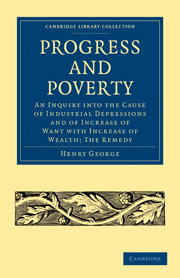 Progress and Poverty
Progress and Poverty Book contents
- Frontmatter
- PREFACE TO FOURTH EDITION
- Contents
- INTRODUCTORY
- BOOK I WAGES AND CAPITAL
- BOOK II POPULATION AND SUBSISTENCE
- BOOK III THE LAWS OF DISTRIBUTION
- BOOK IV EFFECT OF MATERIAL PROGRESS UPON THE DISTRIBUTION OF WEALTH
- Chapter I The dynamics of the problem yet to seek
- Chapter II Effect of increase of population upon the distribution of wealth
- Chapter III Effect of improvements in the arts upon the distribution of wealth
- Chapter IV Effect of the expectation raised by material progress
- BOOK V THE PROBLEM SOLVED
- BOOK VI THE REMEDY
- BOOK VII JUSTICE OF THE REMEDY
- BOOK VIII APPLICATION OF THE REMEDY
- BOOK IX EFFECTS OF THE REMEDY
- BOOK X THE LAW OF HUMAN PROGRESS
- CONCLUSION
- INDEX
Chapter III - Effect of improvements in the arts upon the distribution of wealth
Published online by Cambridge University Press: 07 September 2011
- Frontmatter
- PREFACE TO FOURTH EDITION
- Contents
- INTRODUCTORY
- BOOK I WAGES AND CAPITAL
- BOOK II POPULATION AND SUBSISTENCE
- BOOK III THE LAWS OF DISTRIBUTION
- BOOK IV EFFECT OF MATERIAL PROGRESS UPON THE DISTRIBUTION OF WEALTH
- Chapter I The dynamics of the problem yet to seek
- Chapter II Effect of increase of population upon the distribution of wealth
- Chapter III Effect of improvements in the arts upon the distribution of wealth
- Chapter IV Effect of the expectation raised by material progress
- BOOK V THE PROBLEM SOLVED
- BOOK VI THE REMEDY
- BOOK VII JUSTICE OF THE REMEDY
- BOOK VIII APPLICATION OF THE REMEDY
- BOOK IX EFFECTS OF THE REMEDY
- BOOK X THE LAW OF HUMAN PROGRESS
- CONCLUSION
- INDEX
Summary
Eliminating improvements in the arts, we have seen the effects of increase of population upon the distribution of wealth. Eliminating increase of population, let us now see what effect improvements in the arts of production have upon distribution.
We have seen that increase of population increases rent, rather by increasing the productiveness of labor than by decreasing it. If it can now be shown that, irrespective of the increase of population, the effect of improvements in methods of production and exchange is to increase rent, the disproof of the Malthusian theory—and of all the doctrines derived from or related to it—will be final and complete, for we shall have accounted for the tendency of material progress to lower wages and depress the condition of the lowest class, without recourse to the theory of increasing pressure against the means of subsistence.
That this is the case will, I think, appear on the slightest consideration.
The effect of inventions and improvements in the productive arts, is to save labor—that is, to enable the same result to be secured with less labor, or, a greater result with the same labor.
Now, in a state of society in which the existing power of labor served to satisfy all material desires, and there was no possibility of new desires being called forth by the opportunity of gratifying them, the effect of labor-saving improvements would be simply to reduce the amount of labor expended.
- Type
- Chapter
- Information
- Progress and PovertyAn Inquiry into the Cause of Industrial Depressions and of Increase of Want with Increase of Wealth; The Remedy, pp. 220 - 229Publisher: Cambridge University PressPrint publication year: 2009First published in: 1881
